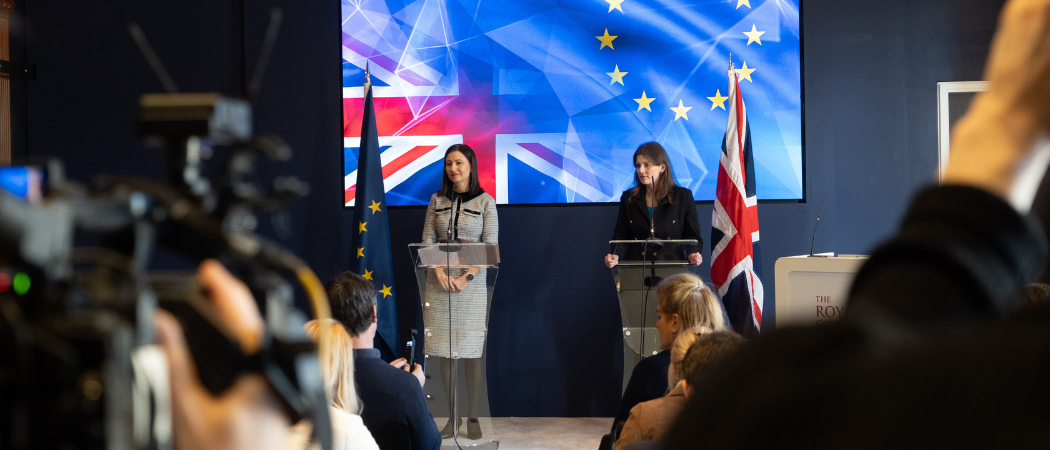With the UK finally associated to the framework programme after a three year hiatus, both sides are seeking to re-engage and build British participation. But on the EU side there are concerns about UK visa fees

European Commissioner for research and innovation Iliana Ivanova (Left) meets with Michelle Donelan, UK secretary of state for science, innovation and technology on a trip to the UK. Photo: Niklas Halle'n / European Union
Research commissioner Iliana Ivanova is visiting the UK to officially launch UK association to Horizon Europe, as part of an effort to rebuild British participation in the programme after the three years of absence sparked by Brexit.
Iliana Ivanova met UK science minister Michelle Donelan on Monday in the latest of several initiatives designed to bring UK businesses and researchers back into the Horizon fold.
“My message to British researchers and innovative businesses is simple and clear: apply,” said Ivanova in a statement released by the UK government.
The UK has been out of the programme since it started in 2021, and only managed to associate at the beginning of this year. Bridging funding from the UK government meant that UK-based academics and companies were still able to take part in pillar II of Horizon Europe, in consortia focusing on global and industrial challenges.
But uncertainty over the future of UK association led to a big drop in participation in pillar II, worth around €53 billion, the majority of the programme’s funding. Last year, UK participation fell to around half of what it was in Horizon 2020.
When Brussels and London agreed association last year, part of the deal was that the EU would help spread the word that the UK was back, and Ivanova’s visit is part of that effort.
“I look forward to seeing many more UK beneficiaries in the Horizon Europe programme in the years to come,” she said.
Last month the UK launched an advertising campaign to encourage businesses to apply for Horizon Europe calls and set up a grant scheme offering up to £10,000, to spur academics to join bids, particularly those who have not applied before.
These ‘pump priming’ grants, being run by the British Academy, are currently open for a second round of applications until February 21. The money is offered to support things like proof of concept, market research, travel, meetings, childcare and so on, rather than actually implementing the project.
As part of her visit, Ivanova visited the Francis Crick Institute in London with the UK minister for artificial intelligence, Jonathan Berry.
Today, Tuesday, Ivanova is meeting ministers and universities in Scotland.
She will also raise concerns about the steep costs of UK visas with her counterpart Donelan, according to the Financial Times.
UK science organisations have long complained that visa costs and red tape discourage academics from moving to the UK, and Ivanova told the Financial Times that European researchers are having “some difficulties” moving to the UK that could hamper the country’s reintegration into Horizon Europe.
It’s thought that this issue has been raised by the EU before, and that EU researchers have, for example, had to turn down Marie Skłodowska-Curie Actions – early career academic training scholarships – hosted by UK institutions, because visa, healthcare and tuition costs would have eaten up too much of their grants.





 A unique international forum for public research organisations and companies to connect their external engagement with strategic interests around their R&D system.
A unique international forum for public research organisations and companies to connect their external engagement with strategic interests around their R&D system.